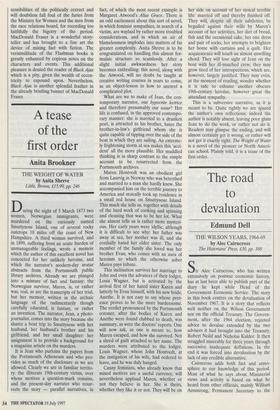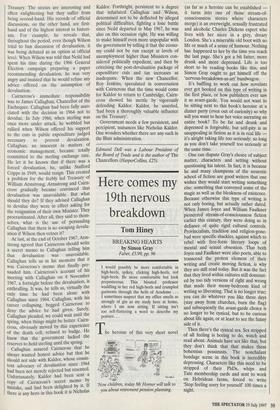The road to devaluation
Edmund Dell
THE WILSON YEARS, 1964-69 by Alec Cairncross The Historians' Press, £30, pp. 380 Sir Alec Cairncross, who has written extensively on postwar economic history, has at last been able to publish part of the diary he kept while Head of the Government Economic Service. The story in this book centres on the devaluation of November 1967. It is a story that reflects well neither on the Wilson Government nor on the official Treasury. The Govern- ment, after the 1964 election, rejected advice to devalue extended by the two advisers it had brought into the Treasury, Robert Neild and Nicholas Kaldor. It then struggled miserably for three years through successive inadequate deflations. In the end it was forced into devaluation by the lack of any credible alternative.
Cairncross adds both fact and atmo- sphere to our knowledge of this period. Most of what he says about Ministerial views and activity is based on what he heard from other officials, mainly William Armstrong, Permanent Secretary to the Treasury. The stories are interesting and often enlightening but they suffer from being second-hand. His records of official discussions, on the other hand, are first- hand and of the highest interest to histori- ans. For example, he reveals that, throughout the period, even though Wilson tried to ban discussion of devaluation, it was being debated as an option at official level. When Wilson was told that Neild had spent his time during the 1966 General Election campaign preparing a paper recommending devaluation, he was very angry and insisted that he would refuse any advice offered on the assumption of devaluation.
Caimcross's immediate responsibility was to James Callaghan, Chancellor of the Exchequer. Callaghan had been fully asso- ciated with the decision in 1964 not to devalue. In July 1966, when sterling was once more under attack, he wobbled but rallied when Wilson offered his support to the cuts in public expenditure judged necessary to prevent devaluation. Callaghan, an innocent in matters of economic management, became totally committed to the sterling exchange rate. He let it be known that if there was a forced devaluation, he, unlike Stafford Cripps in 1949, would resign. This created a problem for the feebly led Treasury of William Armstrong. Armstrong and Cairn- cross gradually became convinced that devaluation was unavoidable. But what should they do? If they advised Callaghan to devalue they were in effect asking for the resignation of their own Minister. They procrastinated. After all, they said to them- selves, what is the use of persuading Callaghan that there is no escaping devalu- ation if Wilson then vetoes it?
At last, at the end of October 1967, Arm- strong agreed that Caimcross should write a secret memo to Callaghan telling him that devaluation was unavoidable. Callaghan tells us in his memoirs that it was Cairncross's memo that finally per- suaded him. Cairncross's account of his meeting with Callaghan on 4 November 1967, a fortnight before the devaluation, is enthralling. It was, he tells us, virtually the only time he had been alone with Callaghan since 1964. Callaghan, with his career collapsing, begged Cairncross to deny the advice he had given. Surely, Callaghan pleaded, we could wait until the spring, when things might be better. Cairn- cross, obviously moved by this experience of the death cell, refused to budge. He knew that the government lacked the reserves to hold sterling until the spring. Callaghan assured Cairncross that he always wanted honest advice but that he should not side with Kaldor, whose consis- tent advocacy of devaluation since 1964 had been not merely rejected but resented. Unfortunately, Kaldor had been sent a copy of Cairncross's secret memo by mistake, and had been delighted by it. If there is any hero in this book it is Nicholas Kaldor. Forthright, persistent to a degree that infuriated Callaghan and Wilson, determined not to be deflected by alleged political difficulties, fighting a lone battle since Neild departed in May 1967, he was also on this occasion right. He was willing to make himself even more unpopular with the government by telling it that the econo- my could not be run except at levels of unemployment higher than Ministers con- sidered politically expedient, and then by criticising the post-devaluation package of expenditure cuts and tax increases as inadequate. When the new Chancellor, Roy Jenkins, speculated in conversation with Cairncross that the time would come for Kaldor to return to Cambridge, Cairn- cross showed his mettle by vigorously defending Kaldor. Kaldor, he asserted, `had been a thoroughly valuable influence on the Treasury'.
Government needs a few persistent, and percipient, nuisances like Nicholas Kaldor. One wonders whether there are any such in the Blair administration.
Edmund Dell was a Labour President of the Board of Trade and is the author of The Chancellors (HarperCollins, £25).



























































 Previous page
Previous page